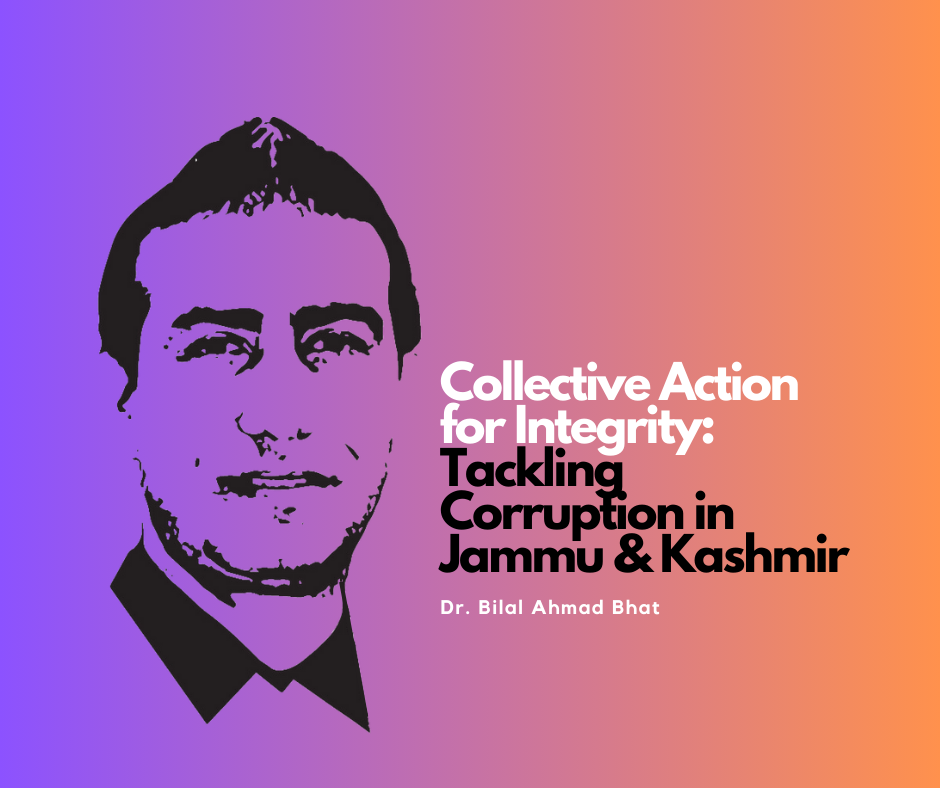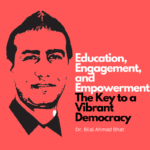Corruption has long been a challenge across the globe, and regions like Jammu & Kashmir (J&K) are no exception. Dr. Bilal Ahmad Bhat, an advocate for ethical leadership and author of “Core Values,” delves into the importance of collective action in combating corruption in J&K. This article explores the role of religion in promoting integrity, an Indian perspective on tackling corruption, and the efficacy of prevention as a tool to reduce corrupt practices.
Understanding the Role of Religion in Promoting Integrity
Religion, deeply ingrained in the fabric of society in Jammu & Kashmir, can play a significant role in promoting integrity and ethical conduct. Religious teachings often emphasize values such as honesty, fairness, and compassion, which are foundational in combating corruption. Leaders and influencers within religious communities can leverage their platforms to advocate for transparency, accountability, and ethical governance, inspiring followers to uphold these values in all aspects of life.
Tackling Corruption: An Indian Perspective
India, as a diverse and vibrant democracy, has grappled with corruption at various levels. However, there have been significant strides in addressing this issue from an Indian perspective:
Legislative Reforms: India has enacted robust anti-corruption laws such as the Prevention of Corruption Act, establishing legal frameworks to prosecute corrupt practices and hold perpetrators accountable.
Technology and Transparency: Initiatives like the online Right to Information (RTI) portal and digital governance platforms promote transparency, empower citizens to access information, and curb corrupt practices.
Public Awareness and Advocacy: Civil society organizations, media outlets, and grassroots movements have raised public awareness about corruption, advocated for ethical governance, and mobilized citizens to demand accountability from authorities.
International Collaboration: India has engaged in international collaborations and agreements to combat cross-border corruption, strengthen law enforcement cooperation, and recover illicit assets.
Prevention: An Effective Tool to Reduce Corruption
Prevention remains a cornerstone in the fight against corruption. Dr. Bilal Ahmad Bhat emphasizes the following strategies as effective tools to reduce corrupt practices:
Education and Awareness: Promoting ethics education, integrity training, and anti-corruption awareness campaigns from an early age can instill values of honesty and integrity in future generations.
Transparent Systems: Implementing transparent and accountable systems in government, public procurement, and financial transactions reduces opportunities for corruption and enhances trust in institutions.
Whistleblower Protection: Establishing robust mechanisms to protect whistleblowers and anti-corruption activists encourages reporting of corrupt practices and facilitates investigations.
Ethical Leadership: Fostering a culture of ethical leadership, where public officials lead by example, prioritize the public good, and refrain from engaging in corrupt activities, sets a positive tone for governance.
Collective Action for a Corrupt-Free Jammu & Kashmir
Dr. Bilal Ahmad Bhat calls for collective action in Jammu & Kashmir to combat corruption:
Community Engagement: Engaging communities, religious leaders, civil society organizations, and youth in anti-corruption initiatives fosters a sense of ownership and responsibility in upholding integrity.
Citizen Oversight: Empowering citizens to monitor government activities, report corrupt practices, and demand accountability from elected officials strengthens democratic institutions and promotes transparency.
Cross-Sector Collaboration: Collaboration between government agencies, law enforcement, judiciary, civil society, and religious institutions facilitates coordinated efforts to tackle corruption comprehensively.
Ethical Governance: Promoting ethical governance practices, merit-based appointments, and zero tolerance for corruption within public institutions sets a precedent for integrity and accountability.
In conclusion, Dr. Bilal Ahmad Bhat advocates for a united front against corruption in Jammu & Kashmir, drawing on religious values, Indian perspectives on anti-corruption measures, and the efficacy of prevention strategies. Through collective action, ethical leadership, and community engagement, J&K can pave the way for a corrupt-free future and uphold the core values of integrity, transparency, and justice.




